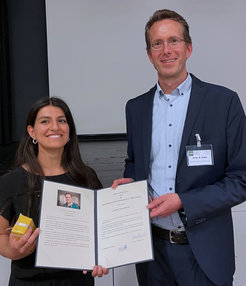Nadya Abbood receives the Hendrik Wolff Prize
MPI Marburg scientist honored for her work in the field of natural products research
During her doctoral thesis in the group of Prof. Dr. Helge B. Bode at the Max Planck Institute for Terrestrial Microbiology, Nadya Abbood addressed the question of how natural products can be found and optimized more easily and quickly in order to be used as future active substances in medicine. She has now been awarded the "Hendrik Wolff Prize for Mass Spectrometric Methods in Microbiology".

Natural products from fungi and bacteria are the most prolific source of new drugs. To date, about 60% of all clinically used antibiotics are based on them. Anti-cancer, antifungal, antiviral and immunosuppressive drugs are also often developed on the basis of natural products.
Prof. Dr. Helge Bode's research group at the Max Planck Institute in Marburg is working on so-called non-ribosomal peptide synthetases (NRPS). These large enzyme complexes enable bacteria to produce a wide variety of natural products according to a modular principle and thus to respond quickly to changing environmental conditions. The researchers are developing methods to intervene in the process of NRPS biosynthesis and specifically modify the enzymes. In this way, products with new or improved properties can be created directly in the laboratory.
In her PhD thesis entitled "Reprogramming Non-Ribosomal Peptide Synthetases Using Synthetic Leucine Zippers", Nadya Abbood developed and optimized synthetic coiled-coil domains, which the researchers call SYNZIPs, as artificial docking sites for NRPS fragments. SYNZIP-mediated interactions were then used to combine these fragments into functional and novel NRPS systems, which could then be identified and quantified using mass spectrometric methods. Their method has already generated numerous new peptides of interest that, with further research, may have pharmaceutical applications.
In her PhD thesis entitled "Reprogramming Non-Ribosomal Peptide Synthetases Using Synthetic Leucine Zippers", Nadya Abbood developed and optimized synthetic coiled-coil domains, which the researchers call SYNZIPs, as artificial docking sites for NRPS fragments. SYNZIP-mediated interactions were then used to combine these fragments into functional and novel NRPS systems, which could then be identified and quantified using mass spectrometric methods. Their method has already generated numerous new peptides of interest that, with further research, may have pharmaceutical applications.

“I would like to express my heartfelt thanks to all those who have accompanied me on my journey and offered their support“, said Nadya Abbood during the ceremony on the 21.09.23. “Whether mentors, colleagues, or my dearest people - your support has been invaluable to my research work. I would also like to extend my sincere gratitude to the initiators of the Hendrik Wolff Prize, who have created a worthy tribute to Hendrik through this award.”
Prof. Helge Bode emphasized the pioneering significance of the thesis. "Nadya's work has laid the foundation for us to recombine NRPS systems very easily and with high throughput, so that we can easily surpass nature's diversity. Her results show the potential of the SYNZIP technology, which will certainly be used in the future to produce biologically active peptides", he said at the award ceremony.
The Hendrik Wolff Prize for Mass Spectrometric Methods in Microbiology is awarded annually in memory of the scientist Dr. Henrik Wolff, who died in 2018 shortly after completing his doctorate.













